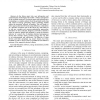Free Online Productivity Tools
i2Speak
i2Symbol
i2OCR
iTex2Img
iWeb2Print
iWeb2Shot
i2Type
iPdf2Split
iPdf2Merge
i2Bopomofo
i2Arabic
i2Style
i2Image
i2PDF
iLatex2Rtf
Sci2ools
167
Voted
EMS
2009
IEEE
2009
IEEE
Simulation of a Smart Grid City with Software Agents
—In the future smart city, new information and communication technologies will enable a better management of the available resources. The future smart grid infrastructure is emerging as a complex system where fine-grained monitoring and control of energy generating and/or consuming entities within the electricity network is possible. This will result to better approaches that will boost energy efficiency. A simulation of a dynamic ecosystem such as the smart city, will enable us to test new concepts and resource-optimization approaches. Therefore we have analyzed, designed, and build a simulator based on software agents that attempts to create the dynamic behavior of a smart city. It simulates discrete heterogeneous devices that consume and/or produce energy, that are able to act autonomously and collaborate. The behavior of these devices and their groupings e.g. smart houses, has been modeled in order to map as near as possible the real behavior patterns of the respective physical...
Related Content
| Added | 20 May 2010 |
| Updated | 20 May 2010 |
| Type | Conference |
| Year | 2009 |
| Where | EMS |
| Authors | Stamatis Karnouskos, Thiago Nass de Holanda |
Comments (0)

